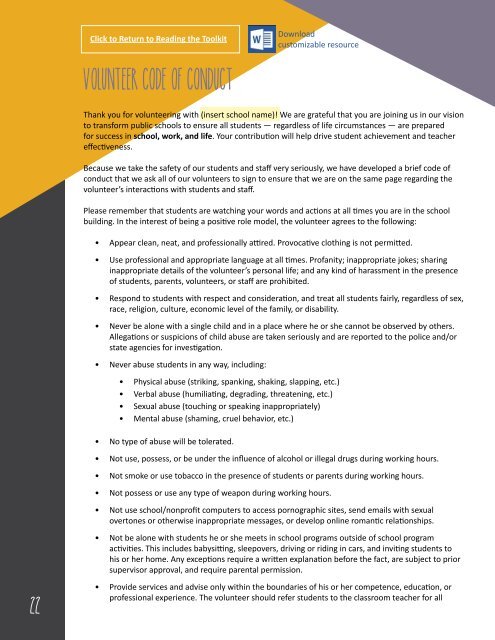DESIGNING COMMUNITY PARTNERSHIPS TO EXPAND STUDENT LEARNING A TOOLKIT
1i4Jz2x
1i4Jz2x
Create successful ePaper yourself
Turn your PDF publications into a flip-book with our unique Google optimized e-Paper software.
Click to Return to Reading the Toolkit<br />
VOLUNTEER CODE OF CONDUCT<br />
Download<br />
customizable resource<br />
Thank you for volunteering with (insert school name)! We are grateful that you are joining us in our vision<br />
to transform public schools to ensure all students — regardless of life circumstances — are prepared<br />
for success in school, work, and life. Your contribution will help drive student achievement and teacher<br />
effectiveness.<br />
Because we take the safety of our students and staff very seriously, we have developed a brief code of<br />
conduct that we ask all of our volunteers to sign to ensure that we are on the same page regarding the<br />
volunteer’s interactions with students and staff.<br />
Please remember that students are watching your words and actions at all times you are in the school<br />
building. In the interest of being a positive role model, the volunteer agrees to the following:<br />
• Appear clean, neat, and professionally attired. Provocative clothing is not permitted.<br />
• Use professional and appropriate language at all times. Profanity; inappropriate jokes; sharing<br />
inappropriate details of the volunteer’s personal life; and any kind of harassment in the presence<br />
of students, parents, volunteers, or staff are prohibited.<br />
• Respond to students with respect and consideration, and treat all students fairly, regardless of sex,<br />
race, religion, culture, economic level of the family, or disability.<br />
• Never be alone with a single child and in a place where he or she cannot be observed by others.<br />
Allegations or suspicions of child abuse are taken seriously and are reported to the police and/or<br />
state agencies for investigation.<br />
• Never abuse students in any way, including:<br />
• Physical abuse (striking, spanking, shaking, slapping, etc.)<br />
• Verbal abuse (humiliating, degrading, threatening, etc.)<br />
• Sexual abuse (touching or speaking inappropriately)<br />
• Mental abuse (shaming, cruel behavior, etc.)<br />
• No type of abuse will be tolerated.<br />
• Not use, possess, or be under the influence of alcohol or illegal drugs during working hours.<br />
• Not smoke or use tobacco in the presence of students or parents during working hours.<br />
• Not possess or use any type of weapon during working hours.<br />
• Not use school/nonprofit computers to access pornographic sites, send emails with sexual<br />
overtones or otherwise inappropriate messages, or develop online romantic relationships.<br />
• Not be alone with students he or she meets in school programs outside of school program<br />
activities. This includes babysitting, sleepovers, driving or riding in cars, and inviting students to<br />
his or her home. Any exceptions require a written explanation before the fact, are subject to prior<br />
supervisor approval, and require parental permission.<br />
22<br />
• Provide services and advise only within the boundaries of his or her competence, education, or<br />
professional experience. The volunteer should refer students to the classroom teacher for all


